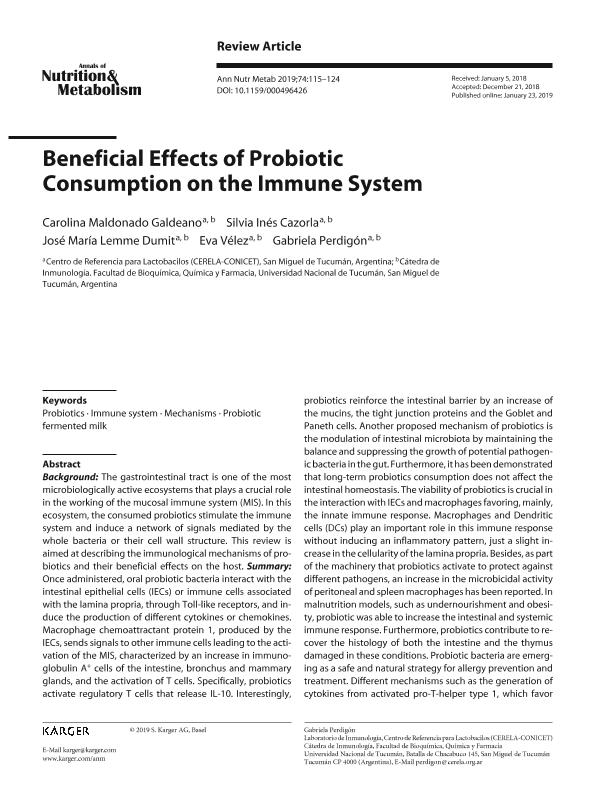Artículo
Beneficial effects of probiotic consumption on the immune system
Maldonado Galdeano, María Carolina ; Cazorla, Silvia Ines
; Cazorla, Silvia Ines ; Lemme Dumit, José María
; Lemme Dumit, José María ; Velez, Eva Maria del Mar
; Velez, Eva Maria del Mar ; Perdigon, Gabriela del Valle
; Perdigon, Gabriela del Valle
 ; Cazorla, Silvia Ines
; Cazorla, Silvia Ines ; Lemme Dumit, José María
; Lemme Dumit, José María ; Velez, Eva Maria del Mar
; Velez, Eva Maria del Mar ; Perdigon, Gabriela del Valle
; Perdigon, Gabriela del Valle
Fecha de publicación:
02/2019
Editorial:
Karger
Revista:
Annals Of Nutrition And Metabolism
ISSN:
0250-6807
Idioma:
Inglés
Tipo de recurso:
Artículo publicado
Clasificación temática:
Resumen
Background: The gastrointestinal tract is one of the most microbiologically active ecosystems that plays a crucial role in the working of the mucosal immune system (MIS). In this ecosystem, the consumed probiotics stimulate the immune system and induce a network of signals mediated by the whole bacteria or their cell wall structure. This review is aimed at describing the immunological mechanisms of probiotics and their beneficial effects on the host. Summary: Once administered, oral probiotic bacteria interact with the intestinal epithelial cells (IECs) or immune cells associated with the lamina propria, through Toll-like receptors, and induce the production of different cytokines or chemokines. Macrophage chemoattractant protein 1, produced by the IECs, sends signals to other immune cells leading to the activation of the MIS, characterized by an increase in immunoglobulin A + cells of the intestine, bronchus and mammary glands, and the activation of T cells. Specifically, probiotics activate regulatory T cells that release IL-10. Interestingly, probiotics reinforce the intestinal barrier by an increase of the mucins, the tight junction proteins and the Goblet and Paneth cells. Another proposed mechanism of probiotics is the modulation of intestinal microbiota by maintaining the balance and suppressing the growth of potential pathogenic bacteria in the gut. Furthermore, it has been demonstrated that long-term probiotics consumption does not affect the intestinal homeostasis. The viability of probiotics is crucial in the interaction with IECs and macrophages favoring, mainly, the innate immune response. Macrophages and Dendritic cells (DCs) play an important role in this immune response without inducing an inflammatory pattern, just a slight increase in the cellularity of the lamina propria. Besides, as part of the machinery that probiotics activate to protect against different pathogens, an increase in the microbicidal activity of peritoneal and spleen macrophages has been reported. In malnutrition models, such as undernourishment and obesity, probiotic was able to increase the intestinal and systemic immune response. Furthermore, probiotics contribute to recover the histology of both the intestine and the thymus damaged in these conditions. Probiotic bacteria are emerging as a safe and natural strategy for allergy prevention and treatment. Different mechanisms such as the generation of cytokines from activated pro-T-helper type 1, which favor the production of IgG instead of IgE, have been proposed. Key Messages: Probiotic bacteria, their cell walls or probiotic fermented milk have significant effects on the functionality of the mucosal and systemic immune systems through the activation of multiple immune mechanisms.
Palabras clave:
IMMUNE SYSTEM
,
MECHANISMS
,
PROBIOTIC FERMENTED MILK
,
PROBIOTICS
Archivos asociados
Licencia
Identificadores
Colecciones
Articulos(CERELA)
Articulos de CENTRO DE REFERENCIA PARA LACTOBACILOS (I)
Articulos de CENTRO DE REFERENCIA PARA LACTOBACILOS (I)
Articulos(INSIBIO)
Articulos de INST.SUP.DE INVEST.BIOLOGICAS
Articulos de INST.SUP.DE INVEST.BIOLOGICAS
Citación
Maldonado Galdeano, María Carolina; Cazorla, Silvia Ines; Lemme Dumit, José María; Velez, Eva Maria del Mar; Perdigon, Gabriela del Valle; Beneficial effects of probiotic consumption on the immune system; Karger; Annals Of Nutrition And Metabolism; 74; 2; 2-2019; 115-124
Compartir
Altmétricas



